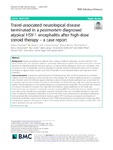Travel-associated neurological disease terminated in a postmortem diagnosed atypical HSV-1 encephalitis after high-dose steroid therapy – a case report
Osterman, Andreas
Ruf, Viktoria C.
Domingo, Christina
Nitsche, Andreas
Eichhorn, Peter
Zimmermann, Hanna
Seelos, Klaus
Zange, Sabine
Dimitriadis, Konstantinos
Pfister, Hans-Walter
Thye, Thorsten
Giese, Armin
Tappe, Dennis
Böhm, Stephan
Background
Human encephalitis can originate from a variety of different aetiologies, of which infection is the most common one. The diagnostic work-up is specifically challenging in patients with travel history since a broader spectrum of unfamiliar additional infectious agents, e. g. tropical disease pathogens, needs to be considered. Here we present a case of encephalitis of unclear aetiology in a female traveller returning from Africa, who in addition developed an atypical herpes simplex virus (HSV) encephalitis in close temporal relation with high-dose steroid treatment.
Case presentation
A previously healthy 48-year-old female presented with confusion syndrome and impaired vigilance which had developed during a six-day trip to The Gambia. The condition rapidly worsened to a comatose state. Extensive search for infectious agents including a variety of tropical disease pathogens was unsuccessful. As encephalitic signs persisted despite of calculated antimicrobial and antiviral therapy, high-dose corticosteroids were applied intravenously based on the working diagnosis of an autoimmune encephalitis. The treatment did, however, not improve the patient’s condition. Four days later, bihemispheric signal amplification in the insular and frontobasal cortex was observed on magnetic resonance imaging (MRI). The intracranial pressure rapidly increased and could not be controlled by conservative treatment. The patient died due to tonsillar herniation 21 days after onset of symptoms. Histological examination of postmortem brain tissue demonstrated a generalized lymphocytic meningoencephalitis. Immunohistochemical reactions against HSV-1/2 indicated an atypical manifestation of herpesviral encephalitis in brain tissue. Moreover, HSV-1 DNA was detected by a next-generation sequencing (NGS) metagenomics approach. Retrospective analysis of cerebrospinal fluid (CSF) and serum samples revealed HSV-1 DNA only in specimens one day ante mortem.
Conclusions
This case shows that standard high-dose steroid therapy can contribute to or possibly even trigger fulminant cerebral HSV reactivation in a critically ill patient. Thus, even if extensive laboratory diagnostics including wide-ranging search for infectious pathogens has been performed before and remained without results, continuous re-evaluation of potential differential diagnoses especially regarding opportunistic infections or reactivation of latent infections is of utmost importance, particularly if new symptoms occur.
Dateien zu dieser Publikation

